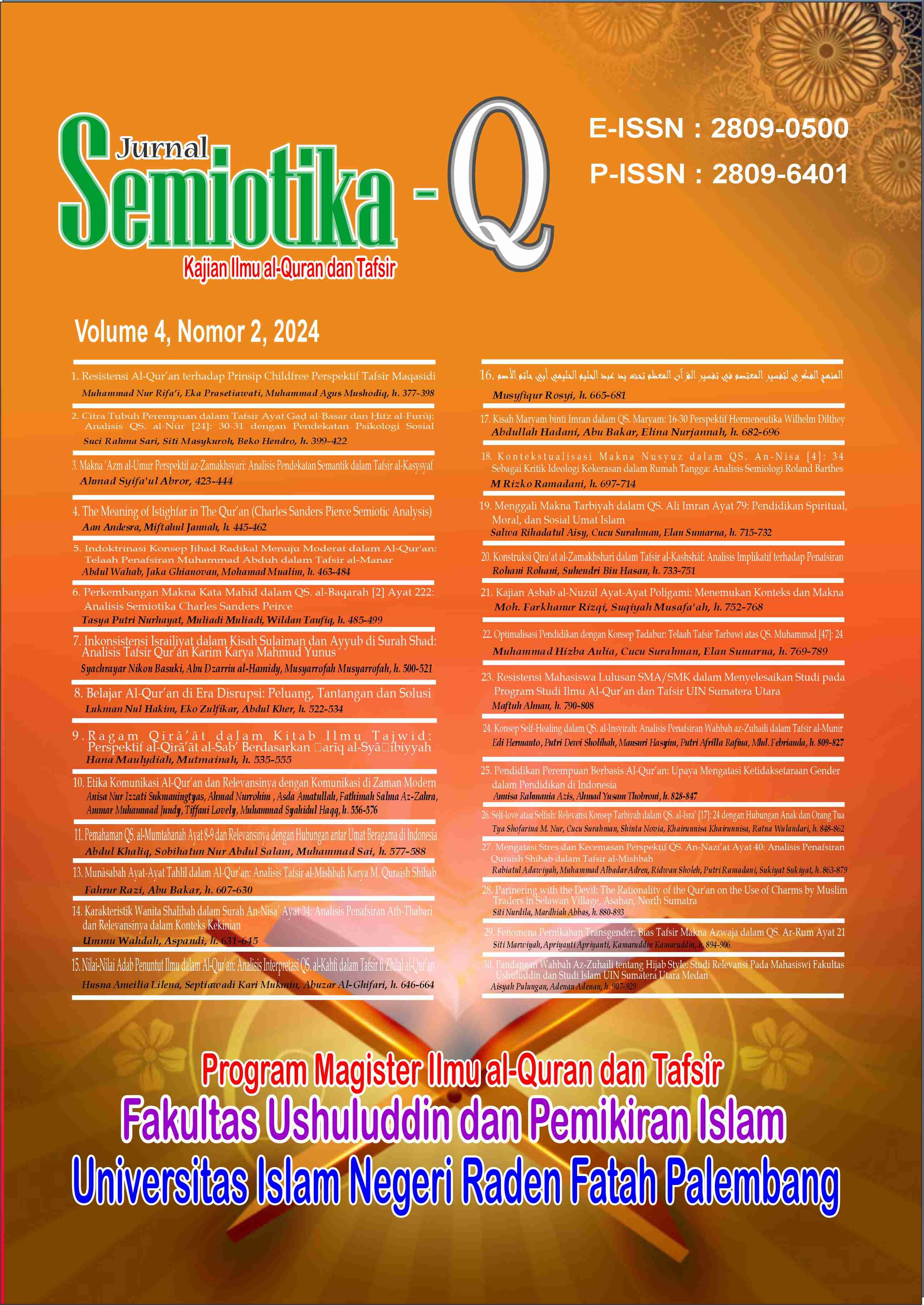Konsep Self-Healing dalam QS. al-Insyirah: Analisis Penafsiran Wahbah az-Zuhaili dalam Tafsir al-Munir
Main Article Content
Abstract
Artikel ini bertujuan untuk menganalisis konsep self-healing dalam perspektif Islam berdasarkan tafsir surah al-Insyirah oleh Wahbah az-Zuhaili. Metode yang digunakan dalam penelitian ini adalah metode kualitatif dengan jenis penelitian library research (studi Pustaka). Dengan demikian, artikel ini memberikan kesimpulan bahwa QS. al-Insyirah memberikan sebuah konsep self-healing, yaitu dengan memberikan bimbingan kepada umat muslim dalam menghadapi kesulitan hidup melalui keyakinan bahwa setiap tantangan akan diikuti oleh kemudahan, serta pentingnya bersandar kepada Allah dalam proses penyem-buhan diri. Wahbah az-Zuhaili memberikan penjelasan tentang hubungan antara kesulitan dan kemudahan dalam QS. al-Insyirah, serta konsep self-healing yang dapat diterapkan dalam kehidupan modern. Konsep self-healing tersebut dapat dilakukan dengan bersandar pada kekuatan spiritual, seperti sabar, tawakal, ikhlas dan optimisme. Artikel ini mengungkapkan keselarasan konsep tersebut dengan konsep psikologi modern seperti mindfulness, gratitude, dan forgiveness yang mendukung dalam proses mental secara holistik.
Article Details

This work is licensed under a Creative Commons Attribution-ShareAlike 4.0 International License.
Authors who publish with this journal agree to the following terms:
- Authors retain copyright and grant the journal right of first publication with the work simultaneously licensed under a Creative Commons Attribution-ShareAlike 4.0 International License that allows others to share the work with an acknowledgement of the work's authorship and initial publication in this journal.
- Authors are able to enter into separate, additional contractual arrangements for the non-exclusive distribution of the journal's published version of the work (e.g., post it to an institutional repository or publish it in a book), with an acknowledgement of its initial publication in this journal.
- Authors are permitted and encouraged to post their work online (e.g., in institutional repositories or on their website) prior to and during the submission process, as it can lead to productive exchanges, as well as earlier and greater citation of published work
How to Cite
References
Ayu, Winda Kusuma, Zulfa Aziza Azhar, and Tiara Eka Putri. “Implementasi Sikap Tawakal Menurut Psikologi Islam Dalam Menghadapi Pandemi Covid-19,” 2020, 1–8.
Az-Zuhaili, Wahbah. al-Tafsir al-Munir fi al-Aqidah wa al-Syariah wa al-Manhaj. Beirut: Dar al-Fikr, 2009.
Az-Zuhaili, Wahbah. Tafsir Al Munir (Aqidah, Syari’ah, Manhaj). Terj. Abdul Hayyie Al-Kattani. Jilid 15. Jakarta: Gema Insani, 2016.
Basid, Abd, and Abd Ghani. “Konsep Ketentraman Hidup Perspektif Quraish Shihab (Studi Surah Al-Insyirah Dalam Tafsir Al-Misbah).” Syariati: Jurnal Studi Al-Qur’an Dan Hukum 9, no. 1 (2023): 13–22. https://doi.org/10.32699/syariati.v9i1.4561.
Bastari, Ahmad. “Textual Preferences for the Interpretation of Verses on Social Equality: Study of Wahbah Al-Zuhaili’s Interpretation in Tafsir Al-Munir”. Jurnal Semiotika-Q: Kajian Ilmu al-Quran dan Tafsir 4, no. 1 (2024).
Fitri, Kemala, Vivik Shofiah, and Khairunnas Rajab. “Kajian Model Psikoterapi Ikhlas Untuk Mencapai Kesehatan Mental.” Psikobuletin: Buletin Ilmiah Psikologi 4, no. 1 (n.d.): 32–42.
Fitriani, Lukman Hakim, and Abu Bakar. “Konsep Mental Block Perspektif Al-Qur’an ( Analisis Penafsiran Surah Al-Insyirah Dan Teori Logoterapi.” Ulumul Qur’an Jurnal Ilmu Al-Qur’an Dan Tafsir 4, no. 2 (2024): 190–206.
Halik, Halik, Muhammad Ilyas Y, Nurul Hikmah Suhafid, La Ode Muhammad Agus Sapdiman, Dini Putri Sari, and Muhammad Ilyas Y. “Teknik Self-Healing Perspektif Al-Qur’an Dan Sunnah Mengatasi Mental Health Disorder Pada Mahasiswa.” SENTRI: Jurnal Riset Ilmiah 2, no. 11 (2023): 4685–92. https://doi.org/10.55681/sentri.v2i11.1780.
Harefa, Afni Mulyani. “Self-Healing Dalam Al-Qur’an (Analisis Psikologi Dalam Surat Yusuf).” Universitas Islam Negeri Syarif Hidayatullah Jakarta, 2022.
Herdiani, Tanti Rostiana, Jaka Ghianovan, and Khoirun Nidhom. “Kalalah Inheritance in QS. Al-Nisa [4]: 176: A Comparative Study of the Interpretation of Ibn Al-’Arabi and Wahbah Az-Zuhaili”. Jurnal Semiotika-Q: Kajian Ilmu al-Quran dan Tafsir 4, no. 1 (2024).
Hidayat, Saepul. “Konsep Jihad Dalam Al Qur’an Studi Penafsiran Ayat-Ayat Jihad Dalam Tafsīr Al-Munīr.” Tafakkur: Jurnal Ilmu Al-Qur’an Dan Tafsir 3, no. 2 (2023): 170–88. https://e-jurnal.stiqarrahman.ac.id/index.php/tafakkur/article/view/127/69.
Irawan, Andi, Uswatun Hasanah, and Lukman Nul Hakim. “Manajemen Sabar Dalam Surah Yusuf (Studi Tafsir Tematik Berdasarkan Analisis Teks Dan Konteks Serta Kontekstualisasinya Dalam Kehidupan Kontemporer).” Semiotika-Q: Jurnal Semiotika Al-Qur’an 1, no. 1 (2021). https://doi.org/10.19109/jsq.v1i1.10235.
Islamiyah. “Metode Dan Corak Kitab Tafsir Al-Tafsir Al-Munir.” Al-Thiqah : Jurnal Ilmu Keislaman 5, no. 2 (2022): 25. https://doi.org/10.56594/althiqah.v5i2.77.
Khasanah, Khuswatun Noor. “Tawakal Dalam Perspektif Kesehatan Mental.” Universitas Islam Negeri Sunan Kalijaga, 2006.
Makiyah, Fawa Idul. “Penafsiran Wahbah Az-Zuhaili Tentang Infaq Dalam Tafsir Al-Munir.” UIN Syarif Hidayatullah Jakarta. Universitas Islam Negeri Syarif Hidayatullah Jakarta, 2018.
Miskahuddin, Miskahuddin. “Konsep Sabar Dalam Perspektif Al-Qur’an.” Jurnal Ilmiah Al-Mu’ashirah 17, no. 2 (2020): 196. https://doi.org/10.22373/jim.v17i2.9182.
Mutohharoh, Annisa. “Self Healing: Terapi Atau Rekreasi?” Journal of Sufism and Psychotherapy 2, no. 1 (2022): 73–88.
Ni’mah, Ulviyatun. “The Living Qur ’ an : Self Healing Dengan Ayat-Ayat Al-Qur’an.” AL-MANAR: Jurnal Kajian Al-Quran Dan Hadits 8, no. 2 (2022): 65–88.
Qasanah, Anistiawati Bulandari, and Umar Faruq Thohir. “Konsep Sabar Dan Shalat Perspektif Tafsir Al-Misbah Sebagai Self-Healing.” At-Tafsir: Journal of Qur’anic Studies and Contextual Interpretation 22, no. 1 (2024): 103–19.
Rahmasari, Diana. SELF HEALING IS KNOWING. Surabaya: Unesa University Press, 2020.
Rahmatika, Saila, Abd Rozaq, and Ulil Fauziyah. “Konsep Self-Healing Perspektif Al-Qur’an Dan Psikologi (Studi Atas Surah Al-Muzammil 1-10).” Asy-Syari’ah: Jurnal Hukum Islam 9, no. 2 (2023): 2548–5903. https://doi.org/10.55210/assyariah.v9i2.1063ps.
SAM, Muhamad Nurbaden. “Wahbah Zuhaili’s Understanding of the Verses on Adultery: A Review of Al-Tafsir Al-Munir.” Mashadiruna: Jurnal Ilmu Al-Qur’an Dan Tafsir 2, no. 2 (2023).
Sari, Fitri Agustina, and Agusman Damanik. “Konsep Self Healing Dengan Zikir Dan Syukur Dalam Al-Qur’an.” JRTI (Jurnal Riset Tindakan Indonesia) 8, no. 4 (2023): 353–61.
Shihab, M. Quraish. Tafsir Al-Misbah: Pesan, Kesan Dan Keserasian Al-Qur’an, Jilid 15. Cet. 11. Jakarta: Lentera Hati, 2002.
Tanzila, Laily. “Hubungan Optimisme Dengan Kesejahteraan Psikologis Pada ANDIKPAS Di LPKA Kelas II Banda Aceh.” Universitas Islam Negeri Ar-Raniry, 2023.
Taufiqurrohman. “Ikhlas Dalam Perspektif Alquran (Analisis Terhadap Konstruk Ikhlas Melalui Metode Tafsir Tematik).” EduProf 1, no. 02 (2019).
Zulfikar, Eko and Abidin, Ahmad Zainal. “Penafsiran Tekstual Terhadap Ayat-Ayat Gender: Telaah Penafsiran Wahbah az-Zuhaili Dalam Kitab Tafsir al-Munir”. Al-Quds: Jurnal Studi Al-Quran dan Hadis 3, no. 2 (2019).

